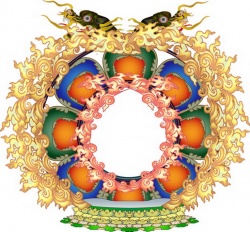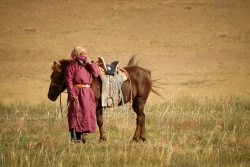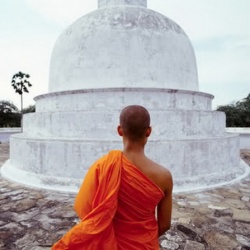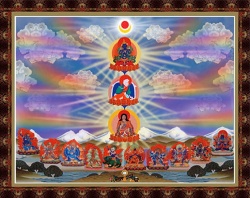Renunciation
Renunciation The wish to be released from samsara.
Janussonin: I hold that there is no one who, subject to Death, is not afraid or in terror of Death.
The Buddha: There are those who, subject to Death, are afraid and in terror of Death. And there are those who, subject to Death, are not afraid or in terror of Death.
Renunciation is not a wish to abandon our family, friends, home, job, and so forth and become like a beggar; rather, it is a mind that functions to stop attachment to worldly pleasures and that seeks liberation from contaminated rebirth.
We must learn to stop our attachment through the practice of renunciation or it will be a serious obstacle to our pure spiritual practice. Just as a bird cannot fly if it has stones tied to its legs, so we cannot make progress on the spiritual path if we are tightly tied down by the chains of attachment.
The time to practice renunciation is now, before our death. We need to reduce our attachment to worldly pleasures by realizing that they are deceptive and cannot give real satisfaction. In reality, they cause us only suffering.
This human life with all its suffering and problems is a great opportunity for us to improve both our renunciation and our compassion. We should not waste this precious opportunity.
The realization of renunciation is the gateway through which we enter the spiritual path to liberation, or nirvana. Without renunciation, it is impossible even to enter the path to the supreme happiness of nirvana, let alone progress along it.
To develop and increase our renunciation, we can repeatedly contemplate the following:
Because my consciousness is beginningless, I have taken countless rebirths in samsara. I have already had countless bodies; if they were all gathered together, they would fill the entire world, and all the blood and other bodily fluids that have flowed through them would form an ocean. So great has been my suffering in all these previous lives that I have shed enough tears of sorrow to form another ocean.
In every single life, I have experienced the sufferings of sickness, ageing, death, being separated from those I love, and being unable to fulfil my wishes. If I do not attain permanent liberation from suffering now, I shall have to experience these sufferings again and again in countless future lives.
Contemplating this, from the depths of our heart we make a strong determination to abandon attachment to worldly pleasures and attain permanent liberation from contaminated rebirth. By putting this determination into practice, we can control our attachment and thereby solve many of our daily problems.
And who is the person who, subject to Death, is afraid and in terror of Death? There is the case of the person who has not abandoned passion, desire, fondness, thirst, fever, and Craving for sensuality. When he comes down with a serious disease, the thought occurs to him, "O, those beloved sensual pleasures will be taken from me, and I will be taken from them!" He grieves and is tormented, weeps, beats his breast, and grows delirious...
Furthermore, there is the case of the person who has not abandoned passion, desire, fondness, thirst, fever, and Craving for the Body. When he is touched by a serious disease, the thought occurs to him, "O, my beloved Body will be taken from me, and I will be taken from my Body!" He grieves and is tormented, weeps, beats his breast, and grows delirious...
Furthermore, there is the case of the person who has not done what is good, has not done what is skillful, has not given protection to those in fear, and instead has done what is Evil, savage, and cruel. When he comes down with a serious disease, the thought occurs to him, "...After Death I am headed for the destination of those who have done what is Evil, savage, and cruel." He grieves and is tormented, weeps, beats his breast, and grows delirious...
Furthermore, there is the case of the person in Doubt and perplexity, who has not arrived at certainty with regard to the True Dhamma. When he comes down with a serious disease, the thought occurs to him, "How doubtful and perplexed I am! I have not arrived at any certainty with regard to the True Dhamma!" He grieves and is tormented, weeps, beats his breast, and grows delirious. This is another person who, subject to Death, is afraid and in terror of Death.
And who is the person who is not afraid or in terror of Death? There is the case of the person who has abandoned passion, desire, fondness, thirst, fever, and Craving for sensuality... who has abandoned passion, desire, fondness, thirst, fever, and Craving for the Body... who has done what is good, what is skillful, has given protection to those in fear, and has not done what is Evil, savage, or cruel... who has no Doubt or perplexity, who has arrived at certainty with regard to the True Dhamma. When he comes down with a serious disease... he does not grieve, is not tormented, does not weep or beat his breast or grow delirious. This is another person who, subject to Death, is not afraid or in terror of Death.
— A IV.184
Now at that time, Ven. Bhaddiya Kaligodha, on going to a forest, to the foot of a tree, or to an empty dwelling, would repeatedly exclaim, "What bliss! What bliss!" Many monks heard him... repeatedly exclaim, "What bliss! What bliss!" and on hearing him, the thought occurred to them, "There's no Doubt but that Ven. Bhaddiya Kaligodha is not enjoying the holy Life, for when he was a Householder he enjoyed royal pleasures, so that now, on recollecting them, he is exclaiming, "What bliss! What bliss!" They went to the Blessed One... and told him... and he told a certain Monk, "Come, Monk. In my name, call Bhaddiya, saying, "The Teacher calls you, my friend."
"Yes, Lord," the Monk answered...
Then Ven. Bhaddiya went to where the Blessed One was staying and, on arrival, having bowed down, sat to one side. As he was sitting there, the Blessed One said to him, "Is it true, Bhaddiya that, on going to a forest, to the foot of a tree, or to an empty dwelling, you repeatedly exclaim, "What bliss! What bliss!"
"Yes, Lord."
"What do you have in mind that you repeatedly exclaim, "What bliss! What bliss!"
"Before, when I was a Householder, maintaining my reign, I had guards posted within and without the royal apartments, within and without the city, within and without the countryside. But even though I was thus guarded, thus protected, I dwelled in fear — agitated, distrustful, and afraid. But now, on going alone to a forest, to the foot of a tree, or to an empty dwelling, I dwell without fear, unagitated, confident, and unafraid — unconcerned, unruffled, my wants satisfied, with my mind like a wild deer. This is what I have in mind that I repeatedly exclaim, "What bliss! What bliss!"




